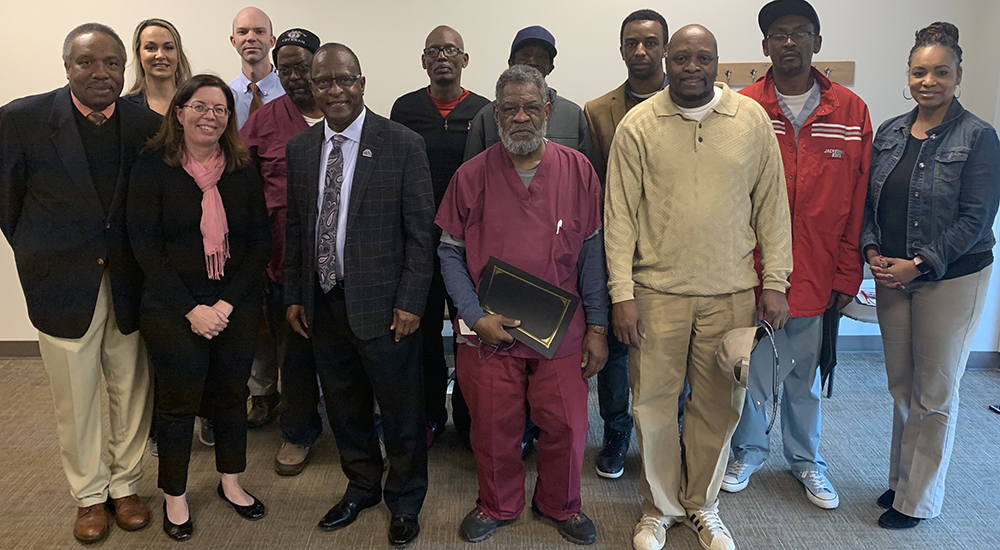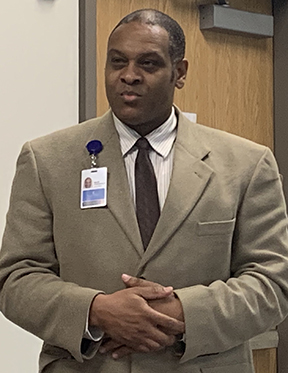The Birmingham Veterans Affairs Medical Center recently held graduations for its 2020 Compensated Work Therapy (CWT) and Veterans School at Work (VSAW) programs.
The ceremony gave many of the graduates (pictured above) the chance to share their experiences in the programs. They also talked about their future plans with fellow graduates, staff and Birmingham VA Health Care System director Stacy Vasquez.
Air Force Veteran Darryl Allen talked about how the CWT program changed his life for the better.
“I was really going through a rough spot in my life. In fact, my family situations and finances were all messed up. I made some bad decisions. I called the VA Crisis Hotline. A representative there listened to me and put me in contact with the Birmingham VA. Two days later, I talked to Mr. Willie Fields.”
Fields serves as the facility’s homeless Veterans coordinator.
Allen enrolled in the CWT program and currently works in the Prosthetic Department at the clinic. “I was in a rebuilding phase in my life and it was very rough. There were few people around me. Overall, me persevering the storm… it worked out for me.”
CWT is valuable clinical vocational rehabilitation program
The CWT program is a VA clinical vocational rehabilitation program. It strives to maintain highly responsive relationships with businesses, government agencies and industry. Further, it promotes employment opportunities for Veterans with physical and mental health challenges.
Marine Veteran John E. Duncan is this year’s only VSAW graduate, and is currently in the CWT program.
“Monica Williams (VSAW facilitator) worked with me,” Duncan said. “She showed me a lot I could not do with a computer.”
Williams helped Duncan with resume writing and other skills.
Once depressed and angry, now in college
“I was depressed, angry and mad. Forty-three years of marriage and I had lost everything. I didn’t know about the homeless Veterans’ programs until a nurse told me about it. Walter Robinson sat down and talked to me and said, ‘Whatever happened back there, let it go.’ I did. Now I am in college studying health.”
Duncan is proud to have gone from homeless to owning a car and being in a new relationship. He credits VA for his success.
“As long as you show you are trying, VA is going to assist you.”
CWT case manager former program participant
Robinson is the Birmingham VA CWT case manager. He knows what it is like to be in the program, as well.
“I was homeless and had an addiction. Now I’ve been clean for 16 years,” admitted the Army Veteran.
While participating in the program, Robinson went to college and obtained a masters degree.
Homeless and unemployed no longer
David Woodruff is another CWT program success story. The Air Force Veteran was unemployed, homeless and needing assistance.
“I came through the program via United Way, went into the CWT Program and passed the drug test in July of 2019. I worked hard on the points that Walter taught us about.”
Woodruff suggests Veterans who need assistance contact the local CWT staff to find out what resources are available.
“Your primary care doctor can point you in the direction of these programs,” said Woodruff.
Derrick Smith is a public affairs specialist with the Birmingham Veterans Affairs Medical Center.
Topics in this story
More Stories
The Medical Foster Home program offers Veterans an alternative to nursing homes.
Watch the Under Secretary for Health and a panel of experts discuss VA Health Connect tele-emergency care.
The 2024 National Veteran Suicide Prevention Annual Report provides the foundation for VA’s suicide prevention programs and initiatives.








Go to your VA Primary care physician and request a refural for the Compinsated Work Therapy. You can do it either in patient or out.
I live in NW Indiana. How can I participate in these programs?